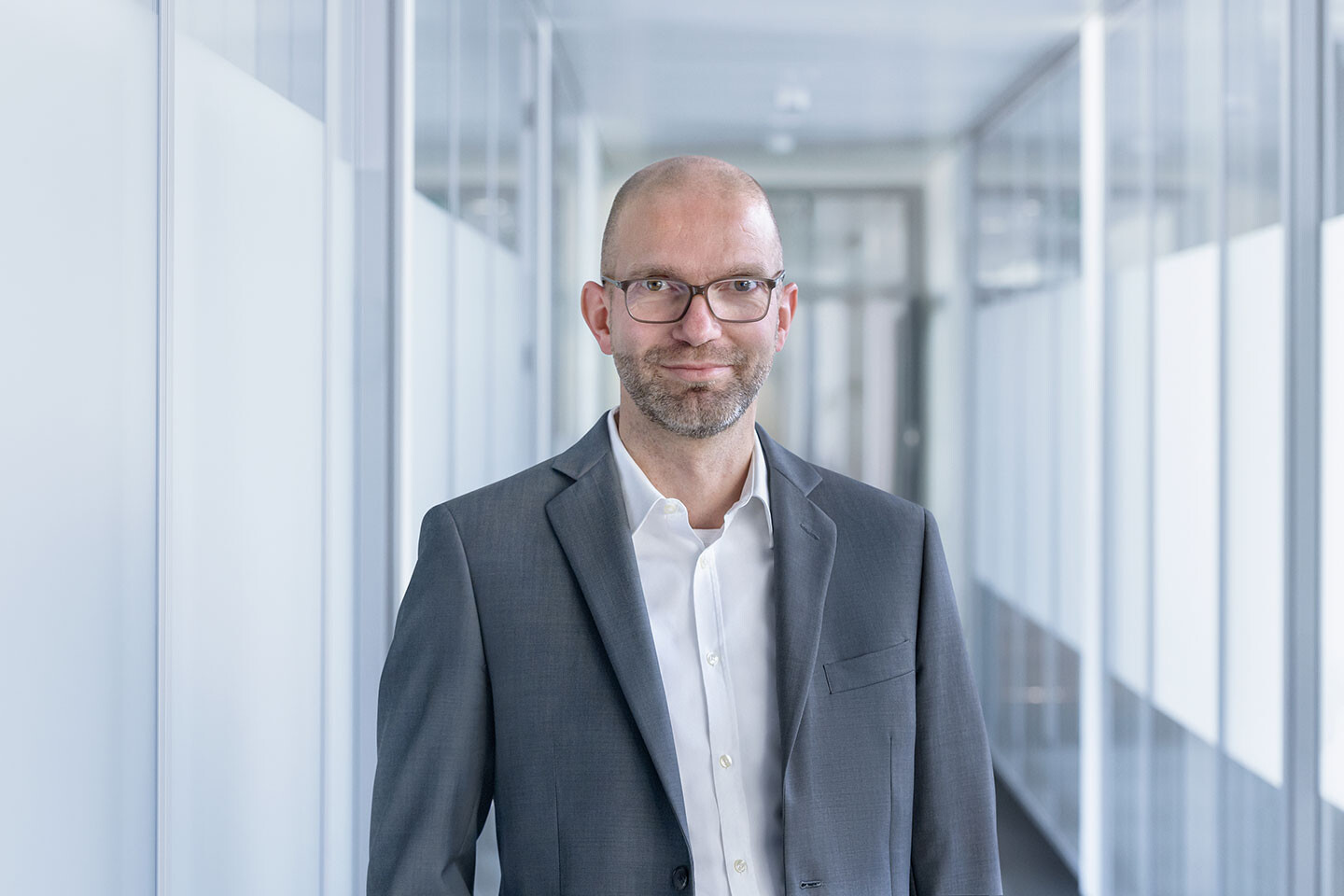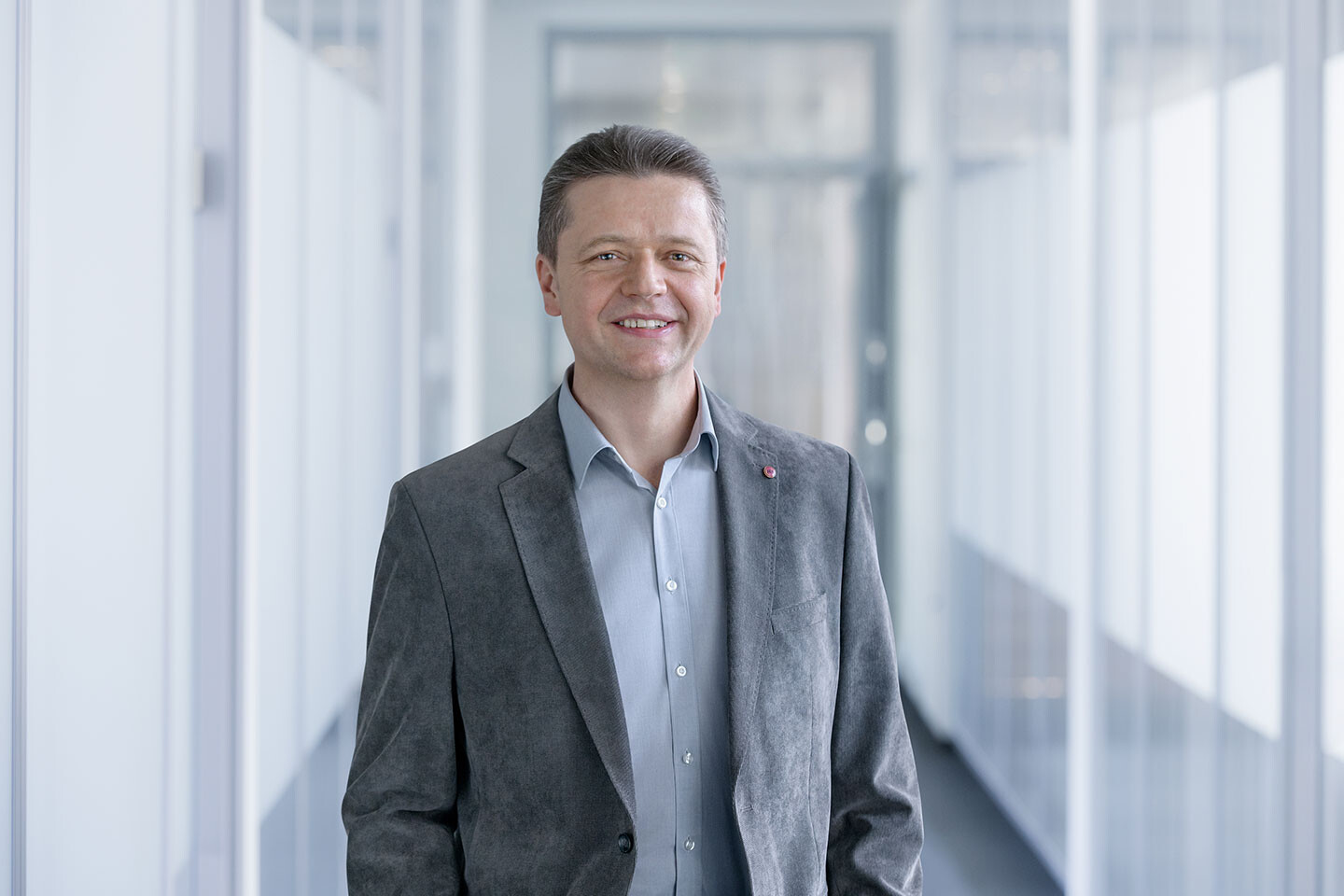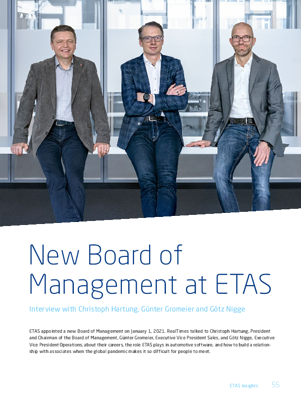New Board of Management at ETAS
Interview with Christoph Hartung, Günter Gromeier and Götz Nigge
ETAS appointed a new Board of Management on January 1, 2021. RealTimes talked to Christoph Hartung, President and Chairman of the Board of Management, Günter Gromeier, Executive Vice President Sales, and Götz Nigge, Executive Vice President Operations, about their careers, the role ETAS plays in automotive software, and how to build a relationship with associates when the global pandemic makes it so difficult for people to meet.

Christoph, you took over as Chairman of the ETAS Board of Management on January 1, 2021. What were the previous stages in your career? And which one had the biggest impact on you?
Christoph Hartung: I started my career in 1999 and spent the next 20 years working for various automakers – Mercedes-Benz and Volkswagen. That whole period was very memorable. Eventually, in 2020, I joined the Connected Mobility Solutions division at Bosch. That’s where I learned to see things from a Tier1 perspective for the first time. I find it helpful being able to tap into my many years of OEM experience to benefit the “other side” in my new role at ETAS. In other words, I have no difficulty seeing things from a customer’s perspective.

Götz, your most recent role at Robert Bosch GmbH was also as Board Member of the Connected Mobility Solutions division, where you were in charge of commercial areas. How did your career lead to that point?
Götz Nigge: I began my career as an officer in the German Navy, which was a tremendously exciting time. I joined Robert Bosch GmbH in 1999 and worked in human resources, purchasing, and various other areas, running and managing a wide range of projects. While I was at Bosch, I spent more than six years working abroad. I have very happy memories of that time. In 2010, I was appointed Vice President Finance at an independent Bosch subsidiary in Italy with around 500 associates. That was a totally new experience for me; it taught me a lot, because the structure of a small company is obviously very different from a global organization the size of Bosch. I think my experience provides an excellent foundation for my new role at ETAS, and I look forward to working with ETAS’ highly motivated associates to continue moving the company into the future.

Günter, ETAS was founded in 1994 and you joined shortly afterwards in 1995. What have been your most important milestones at ETAS?
Günter Gromeier: When I joined ETAS as a calibration engineer in Schwieberdingen, the company was still finding its feet. I’ve worked in many different areas over the course of the past 27 years, including sales, marketing, product management, and corporate development. I particularly enjoy working in intercultural environments, which is why the years I spent in France and China were definitely some of the most exciting of my career. But the last few years at ETAS have been equally remarkable. Developments such as e-mobility, connectivity, and autonomous and semi-autonomous driving are transforming the automotive industry. The market is in a constant state of flux, with new innovations appearing all the time. Software plays a key role in most of these innovations. As a member of the ETAS Board of Management, I’m looking forward to taking an active part in shaping how this field develops.
Christoph, what role does ETAS play in the current state of automotive software development?
Christoph Hartung: We do supply tool and middleware solutions to enable the implementation of these applications and the ability to run them on the control unit. In this respect, our focus is on efficiency and safety in development processes: we have understood how processes, methods, and tools need to change to be able to implement complex systems in a vehicle, manage them and also support them over their entire life cycles. Development efficiency is a crucial factor in bringing new systems on the road. At the moment, the complexity of vehicle electronics is increasing rapidly. These systems can no longer be developed using classical methods. This is good news for us because mastering a high degree of complexity is our expertise.
Do data-driven topics such as ADAS/AD pose new challenges?
Christoph Hartung: Absolutely. We are working on ADAS/AD in a large network of Tier1 suppliers and OEMs to determine what they need and how we can best support their development processes. These data-driven development flows have a clear basic framework: test vehicles drive as many test kilometers as possible and gather the data in the backend where it is simulated and validated, resulting in optimized algorithms being transferred back to the vehicle. Our tools and expertise in the areas of measurement, calibration, and tool chains are in demand to cover these development steps and to work together with the OEMs to implement them in their vehicles. What’s different in automotive development compared to IT is that automotive tools are never only digital, they always need to provide a bridge to the hardware world, and they must also fulfill safety requirements.
You took up your new position in the middle of a global pandemic. Meeting up face-to-face is impossible and it is likely to remain that way for the foreseeable future. So how did you get to know your associates?
Christoph Hartung: Obviously, it would be great if we could have larger gatherings where I could meet associates in person and discuss our strategy, portfolio, and ideas for the future. But since that’s not possible at the moment, we’re mostly using video calls. I’m grateful we have that alternative, and we still have the possibility of meeting in person in exceptional cases as long as we comply with all coronavirus guidelines. But regardless of whether we meet in person or
via video, openness and transparency are the key factors when it comes to communicating with associates.
Let’s finish on a more personal note by asking all three of you: How do you unwind when things get stressful at work?
Götz Nigge: For me it has to be sports. I like running and martial arts.
Günter Gromeier: There are all sorts of outdoor activities that help me unwind. It depends on the time of year, but running and golf are good options for me.
Christoph Hartung: I find sports really helpful, too. I like running, and I even set up a small gym at home so I could work out with my sons during the pandemic.
Thanks for talking to us!
Further information
-
 New Board of Management at ETAS: Interview with Christoph Hartung, Günter Gromeier and Götz Nigge Download
New Board of Management at ETAS: Interview with Christoph Hartung, Günter Gromeier and Götz Nigge Download